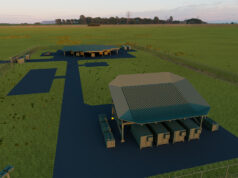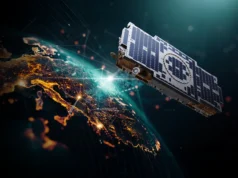Already this year there have been several developments in both the civilian and military realms of space which have warranted further discussion and careful analysis.
This article was submitted to the UK Defence Journal by Rob Clark.
As a brief point of consideration, these have included the first satellite-enabled photographing of a black hole, the near-successful landing of the first commercial space craft by the Israelis, and the emergence of India as a true space power, confirming it as only the fourth state to possess anti-satellite capability with its successful ASAT test last month.
These three events highlight the current dichotomy between recent developments in space exploration between the civilian-industrial, and the military-strategic environments. Whilst civilian space programmes have focused on exploration, satellite imagery and navigation systems, the various military programmes have concentrated on space-debris and missile-launch detection, and anti-satellite capabilities. The rapid developments recently witnessed in anti-satellite capability emphasises how space must now be considered, from a defence perspective, as a new, multi-dimensional domain.
With this realisation that space ought now be given crucial consideration in military strategy, there needs to be a fundamental requirement for the UK to develop a coherent and succinct space programme, merging both the civil and military components, in order to shape future national interests; ones which will be largely determined in this new and evolving environment. Central to this approach is the support of key government ministers and stakeholders.
The current UK Minister of State for Universities, Science, Research and Innovation, Chris Skidmore, spoke this week at the launch of Policy Exchange’s new Space Policy Unit, the first dedicated centre for the study of space by any UK think-tank.
Emphasising the speed at which current developments are taking place across space exploration, Mr Skidmore, as the Minister charged with space affairs, is central to the UK further developing both critical space infrastructure. In particular, developing new satellite technologies enabling higher resolution, real-time imagery, which provides crucial situational awareness in what is such an immense realm.
In order to best achieve this unified effort, the UK should consider setting up a space council, to develop exploration whilst simultaneously mitigating against potential future conflict. A council would allow the UK to safeguard its national interests, said Mr Skidmore, while a fundamental benefit to this joined-up approach would be the ability for every department to be aligned on these priorities.
The sense for pragmatism on this regard was echoed by Policy Exchange’s keynote speaker, US Air Force Secretary Heather Wilson. Remarking how space has turned from a benign domain, into a contested one, Secretary Wilson emphasised the need to maintain defensive capabilities to protect our vital infrastructure, whilst ensuring that we are able to fight back in times of conflict.
Fortunately for the UK, the US is still the global leader in space; with a budget of $US 21.5billon in 2019, NASA dominates civilian exploration. The Indian Space Research Organisation has a budget of approximately $US 1.6billion, whilst the German Aerospace Centre and Italian Space Agency budgets of $US 2.6billion and $US 1.8 billion respectively (2016 figures) ensures strong leadership from across the UK’s allies.
This leaves the UK an opportunity in which to grow its space programme, joining international allies in ongoing developments. With a much lower budget however of slightly under $US 500million (2017/17), the UK Space Agency should seek additional government funding in order to meet both these requirements, and the UK government’s obligation to spend 2.4% GDP on research and development; an area in which London still maintains a leading global role.
Despite historic relations in early space exploration between the Royal Air Force and the USAF throughout the Cold War, centred around RAF Menwith Hill in North Yorkshire, amongst others, the UK has for too long been a net receiver of the US’ space programme. Now, with the formation of Policy Exchange’s Space Policy Unit headed by Gabriel Elefteriu, in addition to influential members of the government embracing the requirement for an increased British participation in space, the UK has an opportunity to help shape an environment increasingly pivotal to national interests.










I think describing India as a space power on the fact it blew up a satellite is a best naive and is potentially very dangerous. The Uk was in a position to do this in the 60’s if it wanted to, many countries could easily build an anti satellite capability if they wanted to, none do because blowing up satellites is irresponsible and dangerous, failed third world countries like India and China do this to show off and distract their population from the vast problems their government’s cause.
The UK is racing ahead in satellite and now launcher development. This is all done privately. NASA pisses $21 billion a year up the wall on a government funded job creation program. The UK does not need a bigger space program. It needs a properly funded military space capability and nothing else. It should continue to contribute to ESA missions in conjunction with other programs and if these are run fairly the UK will pick up a sizeable chunk of the work.
Agreed to a point. A UK space industry needs nurturing at first to thrive not shed loads of money thrown at it but I’m not sure that will be on the cards anyway.
“failed third world countries like India and China” – I don’t see how these two countries are “failed” when China is within the next 10-15 years is set to become worlds biggest economy, same with India projected to be 2-3 ranked economy. Yet these countries you’ve classed as failed?
They have two of the biggest population in the world, higher middle classes and increasingly more billionaires than most of of the western world. Their government has now been showing leadership on the world stage both economically and militarily, combining leadership with vision, can you say the same about our country the UK? No. We gave up the nukes to the Americans, gave up on our own space program, the nukes on our own subs rely upon American guidance (which they could essentially turn off if ever we decided to stop being their poodle) but still we like to call it our delusional ‘independent deterrent’, our armed forces are bare bone because of such cuts that make us barely able to defend ourselves from refugees coming over from France, economically most of our biggest companies are foreign-owned, our country is disintegrating with Scotland wanting another independence vote and Brexit.
We are the failed nation, not them.
@agentB – People like you who denigrate and run down our country and make comments like:
” We are the failed nation”
seriously annoy me but I will temper my anger and offer a counter argument.
* Firstly lets look at history. The USA only got to the moon courtesy of that Nazi war criminal Von Braun who, had he ever ventured to the UK, would have been arrested and charged with war crimes. And hopefully hung.
* NASA exists as the facilitator to US Incorporated’s aerospace activities where private contractors are given fat military contracts and reap the commercial benefits of US taxpayer funded NASA research. Some, like the WTO, call this illegal subsidy.
* We did not ‘give up’ any ‘nukes’ to the Yanks. Well apart from gifting them the basic research and solutions for the Manhattan Project in WWII courtesy of the Tizzard Missions in the first place. We had equally capable atomic and nuclear weapons and we had very capable rockets (Blue Steel air launched and ground launched Blue Streak). We gave up the delivery systems but retained the ‘nukes’
* It is a myth that UK Trident missiles if launched in anger could in any way be ‘switched off’ by the USA. They are autonomous vehicles programmed and set by the UK and its submarine commanders.
* I am pretty sure the ‘bare bones’ of the UK Coastguard and the others can avoid another invasion from France. 1066 was a long time ago and I understand the Germans tried it and failed in 1940 as well.
Now when people like you laud countries like China ( a Communist State that controls it population, Internet, spies on everyone, ignores intellectual copyright, destroys our environment, pays poverty wages and has one global objective – military dominance) and India (a country that was receiving UK Foreign Aid until recently, that runs a racist Caste system, has a majority of its population in abject poverty, is unacquainted with Health & Safety laws and cannot even provide basic sanitation for its population) and somehow suggest they are ‘better’ than us because they find the money to play space games by abusing their vast populations to create global ‘wealth’ (that somehow never seeps down to that same population) then forgive me if I think you are not quite the sharpest knife in the drawer. Or maybe you just think it is rather clever to slag off your own country. If it is your country. It is THIS that really annoys me.
I am allowed one link and I can offer no better example of your ignorance than this from the BBC about a place that used to be the Rocket Propulsion Establishment at Westcott Venture Park. I happily admit to copying its text but in it you will find companies like:
* Falcon Project – makes research rockets and specialist fuels for the UK and US military
* Reaction Engines – Which will be testing Sabre, its revolutionary air-breathing rocket engine for future space vehicles, plus the “precooler” described on UKDJ earlier
* Moog UK – Whose Leros 1b engine powered Nasa’s Juno space probe into orbit around Jupiter using a new motor technology also seen on Nasa Mars and Mercury probes.
* Nammo – Maker of rocket engines and thrusters that separate Ariane 5 rocket stages and those that steer and vector satellites.
* Airborne Engineering – The rocket and propulsion test services company there as a testing site.
* RPE itself developed and tested the Raven and Cuckoo engines for Skylark, the British suborbital rocket that undertook 450 space science missions between 1957 and 2005.
http://www.bbc.com/future/story/20180418-the-return-of-a-secret-british-rocket-site
You sort of never mentioned any of that. But of course you DID mention the fallacy that Scotland wants independence. Actually it didn’t in 2014 and does not now. It is the rather noisy SNP led by the politically creative Mrs Sturgeon that want it. However ‘Scotland’ and the SNP are not the same thing given they are a minority Government.
And of course no rant devoid of fact would ever be complete without the oblique use of ‘Brexit’ as some sort of confirmation bias. I best not comment further on that or I will make your embarrassment even more acute ….
Chris….So pleased you’re back.
Well said and agree with all.
Chris
That was exceptionally well put.
The recent launch of an anti-satellite missile by India has highlighted how defenceless the majority of satellites are, especially those placed in low earth orbit. The debris caused by the Indian test caused the International Space Station to use up fuel to increase its orbit to miss the cloud. Imagine what would have happen to it as it flew through the cloud of debris. The skin panels are less than 5mm thick aluminium alloy, so it wouldn’t put up much of a fight.
Our commercial satellite and rocket industry have had a exponential growth in the last five years and is predicted to still show the same pattern for the foreseeable future. In fact a lot of countries are either using our tech or having us produce their satellites. With the planned low earth orbit launch pad in Northern Scotland and the proposed use of the airfield at Newquay (RAF St.Mawgen) for horizontal take off space launches, we are starting to look competitive in the launch vehicle market as well.
There is a significant problem with defending satellites from deliberate damage by a foreign power. In that there is a significant weight restriction that can be placed on the satellite. As every kilo costs at about £6400 to put in to low earth orbit, high orbits just add another zero to the cost. Therefore to add “armour” to a satellite will incur a significant additional cost over and above the basic cost, which will be mostly redundant throughout its life. The other issue is fuel. There is a compromise on the amount of fuel the satellite can carry. Whether it uses a chemical rocket or ion drive they all require some material that is used as a propellant. The fuel is generally used to re-position the satellite after its orbit has been degraded by Earth’s gravity. Therefore there is only a limited amount that could be used to avoid some form of physical attack.
So perhaps, just like tanks are doing now, they need an active as well as a passive protection system?
Why can’t we design an unmanned craft that refuels satellites from say the international space station or just from space.
It’s already been done.
https://en.m.wikipedia.org/wiki/Robotic_Refueling_Mission
The issue with armoured satellites is that the debris is traveling at hypersonic speed some times more than 25 times the speed of sound. Even battleship armour won’t stop projectiles at those kind of speeds. The best if not only protection is probably large swarms of smaller satellites. Active protection systems won’t work at those kind of speeds and would likely add to the debris cloud.
Now I am no expert in any of this but I do call myself an amateur astronomer I suppose, so here we go.
The UK has had every opportunity in the past and present to expand its space interests, it even had its own proper space program in the 50s/60s. And today there are many exciting opportunities namely ‘Skylon’. This technology needs to be given the full go ahead and backing from the government and it needs to remain a UK project, we can’t sell this tech to the Americans at first opportunity to win a few small political points.
What ‘Skylon’ does is it makes Space affordable, at least more affordable than the Space Shuttle or conventional launchers. Will Skylon open up sovereign manned space flights?? Who knows! Maybe even a cheap modular space station could be transported! But lets be little more realistic for now!
We need to stay a key member of the ESA, although perhaps we should also expand our commitments to other space agencies, namely the Americans. I can see the opportunity to work with other close allies i.e. the Commonwealth(CANZUK) on working together on a independent space agency(‘Commonwealth Space Agency’ comprising of all 4 national space agencies??) outside of NASA and the ESA. This could begin with developments of the Galileo replacement project after the EU has thrown us out of it, even though it is essentially a British project!
We need to keep our foot in every door we can.
Our Commercial space industry is booming, a majority of all small satellites are built here but we need to see more government projects, centred firstly on SABRE engine developments. The government has always been the key opposition to creating a true UK space industry and agency.
Now military, we are a long way off creating a ‘Royal Space Force’ but the reforming of No18 Squadron RAF to focus on space and other modern environments like cyber is a great step in the right direction, but again more capability is needed, mainly with military satellites, a sovereign capability is required, Im sure the Galileo replacement research could be essential and it could use similar technologies.
Good post Keith, but what’s this 18 Squadron reforming? Where did you read that?
18 Squadron is a Chinook outfit, so curious which unit you’re refering to.
Do you have a link?
I’m a complete idiot, I meant No.18 Group, but its actually No.11 Group, my mistake!
Of course No.18 Group was ex Coastal Command.
You’re nothing of the sort mate.
Yes, 11 Group. Renaming of the Existing A4 RAF ASCS force and adding cyber and space.
Bit of a deliberate headline grabber by MoD as Fylingdales already tracks space debris, satellites, and missiles, and the NADOC at High Wycombe has had a space role too for some time.
As you say though all positive steps having it all under one command.
Agree Keith, the UK has lost several opportunities to become a space power but frittered it away, leaving France to dominate European space affairs.
My memory might be a tad muzzy but wasn’t it Thatcher who decided that in both Space and Commercial Aircraft, Europe had no hope of competing with the US (the latter she certainly did) and thus withdrew official support or interest. Those decisions have cost us dear sadly, though hopefully in the former case going backwards to go forwards in a leaner and far more focused way, may have actually been fulfilled for once, though despite Government rather than because of it.
Skylon and Sabre I think have been the real frustration because considering, after 25 years or so of official disinterest, it is still at the forefront of such technology in the field despite the relative neglect compared to what could have been, is amazing and fortunate I would say. I see now that there are a range of international efforts to create ‘circular flow’ ramjet solutions to do something of what Sabre promises but capable of using supersonic air for combustion which I think shows how it is being taken seriously around the World. Shame we don’t have the interest, or Political will to chose u proven technologies like this to support so, like so many before them, for example blue lasers or indeed Arm never truly benefit the Nation as much as they should and create whole new industries longer term. Like the City the Country itself is all about short termism and safe profits looking for the sure thing that others have initiated instead of long term planning and true investment in potential game changers.
Reciculous when you think of it, we were a decade ahead of France in terms of rocket technology in the 60s, hey we were do damn good at it we even sold some of that rocket engine tech to the Americans back in the day though Yay we can still look at it in the Science Museum and celebrate our design brilliance while musing our inate political and management paralysis. Far too often while our technology has been superior the ability to develop, support and market it has been appalling. Constantly changing decisions hardly helps but typical in a 2 party state I consider and likely making such black/white thinking endemic in our culture sadly.
UK Space Agency
All of this sounds very interesting and I have a few ideas of my own. How do I get involved and /or get a job in the UK Space Industry and / or the Government department driving it e.g. the area run by Mr Skidmore?